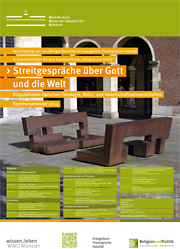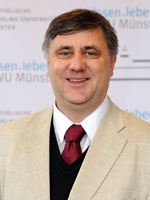First “Debates about God and the World”
New format by the Cluster of Excellence brings the theologies, the humanities and natural sciences into conversation with one another – 100 years of Protestant theology in Münster – “No single subject can answer complex issues concerning the future”
Press release of the Cluster of Excellence, 31 March 2014

The University of Münster’s Cluster of Excellence “Religion and Politics” intends to stimulate the exchange between Protestant and Catholic theologies, the humanities, and natural sciences. To this end, together with the Department of Protestant Theology, the Cluster will for the first time present the public series “Debates about God and the World”. Prof. Dr. Reinhard Achenbach, Protestant theologian, dean, and member of the Cluster of Excellence’s board of directors, explains, “Our societies are facing fundamental political, social, and ethical challenges such as the discussion about medicide for children or the consequences of the financial crisis.” No single subject can answer such complex issues anymore. “The disciplines should wrestle with these matters together.”
At each of the debates, taking place on Tuesday evenings between 8 April and 8 July, a theologian and a non-theologian will discuss pressing issues concerning the future in a format open to public contributions. “The first step towards interdisciplinary exchange is dispute”, according to the scholar. “There is no science without dispute. It is just as important as doubt.” The new series is a key event in the Department of Protestant Theology’s anniversary year: it celebrates its centennial beginning with a ceremony at the Residence on 24 April. It will be followed by numerous lectures, concerts, and symposia.
Brain research, cosmology, business ethics
The topics of the debates will range from the origins of the universe, brain research, business ethics, and the policy of peace, to the cooperation of religions and their relationship with atheism. Renowned researchers from the University of Münster and other German, French, and Swiss universities were invited: Protestant, Catholic, and Islamic theologians will debate with representatives from philosophy, physics, medicine, sociology of religion, and religious studies, Jewish studies, law, political science, and economics. Among them are the Freiburg neurobiologist Robert-Benjamin Illing, the President of the Community of Protestant Churches in Europe (GEKE), and regional bishop Friedrich Weber, the Münster medical ethicist Prof. Dr. Bettina Schöne-Seifert, the Münster physicist Prof. Dr. Markus Donath, the Green politician and policy of peace expert Winfried Nachtwei, and Dr. Michael Schmidt-Salomon from the board of the Giordano Bruno Stiftung.

Prof. Dr. Reinhard Achenbach
“The relationship of theology and non-theology – of denominational and non-denominational research – is not free of tension; their exchange, however, is all the more exciting”, according to Old Testament scholar Reinhard Achenbach. “Some look at religion from the outside, others from the inside.” In doing so, theologians do not intend to dictate to other scholars their view of the world. Rather, there is the opportunity for the disciplines to learn from each other. “Biblical exegetes could not work without methods of historical science; pastoral theologians could not do without the insights of psychology.” Economists, conversely, increasingly request the expertise of theologians, for example, where international justice is threatened, which is also a consequence of the economic crisis.
“Medicine, on the other hand, has made tremendous progress as regards the prolonging of life”,according to the theologian. “But when it comes to decisions at the close of life, it reaches its limits and seeks dialogue with ethics.” In brain research, too, the disciplines can complement one another. “Natural scientists do not generally describe the transcendental”, says Prof. Achenbach. “But for some years now, neurologists have been interested in the origins of religion, investigating physiological reactions to religious experience.” Here, the dialogue with theologians could also provide new perspectives. “Man is not only a biological being. He also has social, psychological, and religious attributes.” There is “much to talk about” here.
The debates will be held on Tuesdays from 6.15 to 7.45 p.m. in lecture hall F1 in Münster’s Fürstenberghaus, Domplatz 20-22, in place of the regular lecture series of the Cluster of Excellence “Religion and Politics”. The new format was given the subtitle “Disputations between theology and natural and social sciences”. (vvm/ska)
Programme
Pluralität der Religionskulturen |
||
| 08.04.2014 | Andreas Feldtkeller (Evangelische Theologie/ Religions- und Missionswissenschaft sowie Ökumenik, Berlin) und Perry Schmidt-Leukel (Religionswissenschaft und Interkulturelle Theologie, Münster) Moderation: Jutta Sperber (Religionswissenschaft, Münster) |
Eine Religion – viele Religionen |
| 15.04.2014 | Dorothea Sattler (Katholische Theologie, Münster) und Hans-Peter Großhans (Evangelische Theologie/ Ökumenische Theologie, Münster) Moderation: Jürgen Werbick (Katholische Theologie/ Fundamentaltheologie, Münster) |
Eine Kirche – viele Kirchen |
| 22.04.2014 | Eva Maria Hinterhuber (Soziologie, Berlin), Susanne Talabardon (Judaistik, Bamberg) und Milad Karimi (Islamische Philosophie/ Zentrum für Islamische Theologie, Münster) Moderation: Perry Schmidt-Leukel (Religionswissenschaft und Interkulturelle Theologie, Münster) |
Christen – Juden – Muslime |
Gott denken |
||
| 29.04.2014 | Michael Schmidt-Salomon (Philosoph und Vorstand Giordano-Bruno-Stiftung, Oberwesel) und Armin Kreiner (Katholische Theologie/ Fundamentaltheologie, München) Moderation: Michael Beintker (Evangelische Theologie/ Reformierte Theologie, Münster) |
Atheismus und traditionelle Religion |
| 06.05.2014 | Markus Donath (Physik, Münster) und Samuel Vollenweider (Evangelische Theologie/ Neues Testament, Zürich) Moderation: Matthias Schleiff (Evangelische Theologie/ Reformierte Theologie, Münster) |
Gott – Mensch – Universum |
| 13.05.2014 | Karl-Heinz Ohlig (Religionswissenschaft, Saarbrücken) und Michael Beintker (Evangelische Theologie/ Reformierte Theologie, Münster) Moderation: Hans-Peter Großhans (Evangelische Theologie/ Ökumenische Theologie, Münster) |
Monotheismus – Polytheismus – Trinität? |
Naturwissenschaft und Theologie |
||
| 20.05.2014 | Robert-Benjamin Illing (Neurologie, Freiburg) und Dirk Evers (Evangelische Theologie/ Systematische Theologie, Halle) Moderation: Traugott Roser (Evangelische Theologie/ Praktische Theologie, Münster) |
Neurologie und Kognitionswissenschaft: Entsteht die Religion im Gehirn? |
| 27.05.2014 | Bettina Schöne-Seifert (Medizinethik, Münster) und Reiner Anselm (Evangelische Theologie/ Theologische Ethik, Göttingen) Moderation: Thomas Gutmann (Rechtsphilosophie und Medizinrecht, Münster) |
Der Beginn des Lebens |
| 03.06.2014 | Hartmut Schmidt (Leiter der Transplantationsmedizin am Universitätsklinikum Münster) und Traugott Roser (Evangelische Theologie/ Praktische Theologie, Münster) Moderation: Christian Grethlein (Evangelische Theologie/ Praktische Theologie, Münster) |
Das Ende des Lebens |
Theologie und Gesellschaft |
||
| 17.06.2014 | Matthias Casper (Rechtswissenschaft/ Unternehmens- und Kapitalmarktrecht, Münster) und Traugott Jähnichen (Evangelische Theologie/ Christliche Gesellschaftslehre, Bochum) Moderation: Ludwig Siep (Philosophie, Münster) |
Internationale Gerechtigkeit: Herausforderungen an die Wirtschaftsethik |
| 24.06.2014 | Landesbischof Friedrich Weber (Präsident der Gemeinschaft Evangelischer Kirchen in Europa (GEKE), Braunschweig) und Ulrich Willems (Politikwissenschaft, Münster) Moderation: Reinhard Achenbach (Evangelische Theologie/ Altes Testament, Münster) |
Europa und die Verantwortung der Religionsgemeinschaften |
| 01.07.2014 | Hans-Georg Ziebertz (Katholische Theologie/ Religionspädagogik, Würzburg) und Bernhard Dressler (Evangelische Theologie/ Religionspädagogik, Marburg) Moderation: Detlef Pollack (Religionssoziologie, Münster) |
Religion und Bildung |
| 08.07.2014 | Wolfgang Lienemann (Evangelische Theologie/ Systematische Theologie, Bern) und Winfried Nachtwei (Mitglied des Bundestags a.D., Bündnis 90/ Die Grünen, Münster) Moderation: Karl Gabriel (Katholische Theologie/ Christliche Sozialwissenschaften, Münster) |
Friedensethik |
Debates about God and the World. Disputations between theology and natural and social sciences
Sommer Semester 2014
8 April until 8 July 2014
Tuesdays,6.15 bis 7.45 p.m.
Lecture hall F1 at the Fürstenberghaus
Domplatz 20-22
48143 Münster

